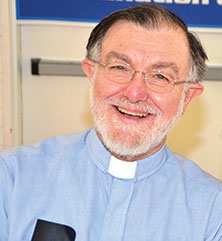Father Patrick Madden is returning for a fourth semester at IPS. He will be teaching an online course: Introduction to the New Testament.
Fr. Madden holds a degree in Biblical Studies from The Catholic University of America and currently serves as a priest for the Catholic Diocese of Shreveport, Louisiana. Previously, Fr. Madden was a full-time hospital chaplain for eight years and has experience teaching at both St. Mary’s Seminary in Baltimore and the University of Dallas. In addition, he served as Director of the Greco Institute and remains there as adjunct faculty.
During his time at IPS, Fr. Madden hopes that his students get to understand that God’s dealings with His people are a historical development.
“The main mistake that beginners make is that people think they will find the teachings of the church in the Bible. Nobody who wrote the Bible believed in Original Sin or the Blessed Trinity or the divine nature of Jesus, but all of these are legitimate developments of biblical thought,” noted Fr. Madden.
One of his favorite phrases is, “What did it mean when the ink was wet?”
“A concrete example of this would be the meaning of the phrase ‘Son of God.’ Every author of the NT agrees that Jesus is the ‘Son of God,’ but each understands this differently. For example, Matthew and Luke understand ‘Son of God’ as involving a miraculous conception. By contrast, knowing nothing of a miraculous conception, Paul links Jesus’ divine sonship with the resurrection (Rom 1:4). John also displays no awareness of a miraculous conception, but has no hesitation to link Jesus with the ‘Word’ that existed with God in the beginning. The richness of the NT is revealed when we examine the details of precisely what each author means. A common mistake of beginners is to ‘read right past’ such a phrase, and think, ‘I know what Son of God means: I say it every Sunday in the creed: eternally begotten of the Father, true God from true God, etc.’ However, importing this later (valid) development of Christian theology back into the NT will result in a misunderstanding of what the biblical authors were teaching.”
Fr. Madden hopes that he and his students can remember to be humble because “we know a lot less than we think we know.”
Moreover, he believes that the evolution of the church is not over. He poses the questions:
- If Paul in Romans 16 calls the woman Junia an apostle, what would successors of the apostles look like in the church today?
- What is our pastoral response going to be to the questions that we are facing today?
“We honor the great saints and those who have gone before us, not by repeating their answers, but by doing what they did – getting the core message of Christianity into dialogue with the events and the spirit of the times,” said Fr. Madden. “There is continuity, but there is also diversity.”
Above all else, he wants this class to be pastoral. “I can show them the evolution, but it is up to the students to take what they learn in my class, and other classes, to find out how the gospel gets incarnate in each of their chosen ministries,” said Fr. Madden. “For me, the study of scripture has been immensely liberating, and I love to teach adults because they are here because they want to be.”
Fr. Madden says his favorite part about teaching is that it forces him to learn. “They say if you want to learn something, teach it. You don’t really understand something until you have to explain it,” stated Fr. Madden. “I learn from the research I do and I also learn from the feedback I get from students. They keep this 66 year old young. I love to learn. It keeps my mind active.”
IPS is happy to welcome Fr. Madden back and is looking forward to this new semester with great faculty.
Join the conversation by following @BrianSchmisek on Twitter and @LoyolaIPS on Instagram! Also, network with the Loyola Chicago IPS community on LinkedIn.
